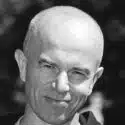Aragon MotoGP: 'Mandatory' Márquez on the march
At Aragon, Marc Márquez scored maximum points for the first time in two months. Finally, he seems to have realised the trickiest part of the race is when the rear tyre is new, not when it's old
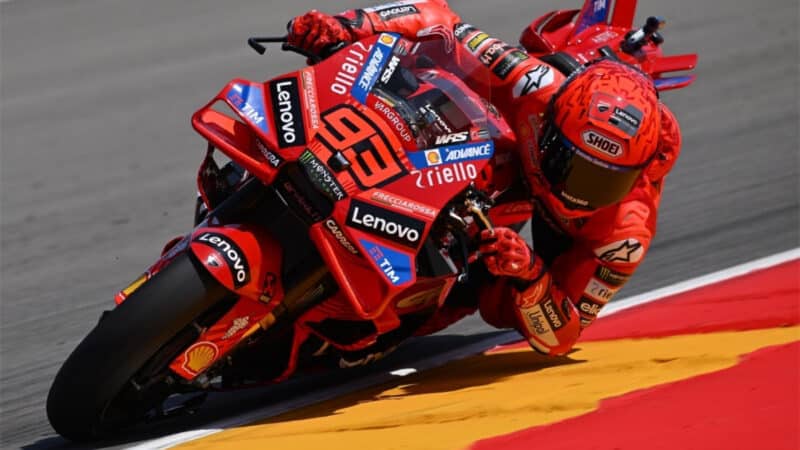
Márquez topped every session and race at Aragon, the first time anyone’s done that since 2015, when he ruled Sachsenring
Michelin
Three months ago, Marc Márquez was going to walk the 2025 MotoGP championship. He won the sprint and main race at the season-opening Thai Grand Prix, he won the sprint and main race at round two in Argentina and he won the sprint at round three in the USA. Then everything went pear-shaped.
Believe it or not, his Sunday success at Aragon was his first grand prix victory in two months, since he ran away with the Qatar Grand Prix in March. More importantly, when he arrived at Aragon last week, he knew he had to change his approach, because he had crashed on three of the previous five Sundays: at COTA, Jerez and Silverstone.
This was a worrying habit. Yes, Márquez was famous for crashing during his Honda years, but he nearly always crashed in practice, while exploring and experimenting with the limit. This year it’s the other way around.
During 2019, his greatest campaign so far, he crashed 14 times, but only once in a race. So far this year he’s crashed five times, three times in races. Those numbers will have put fear of God into him.
That’s why Márquez knew he had to dominate at Aragon. Not only to secure maximum points but to convince the rest of the grid of his impregnability. His recent mistakes have given his rivals hope and that’s exactly what he doesn’t want to give them. He wants them defeated before they even leave pitlane.
And that’s what he did on Friday, Saturday and Sunday, becoming the first rider to top every session and race in a full decade. The last rider to do that? Marc Márquez, Sachsenring 2015.
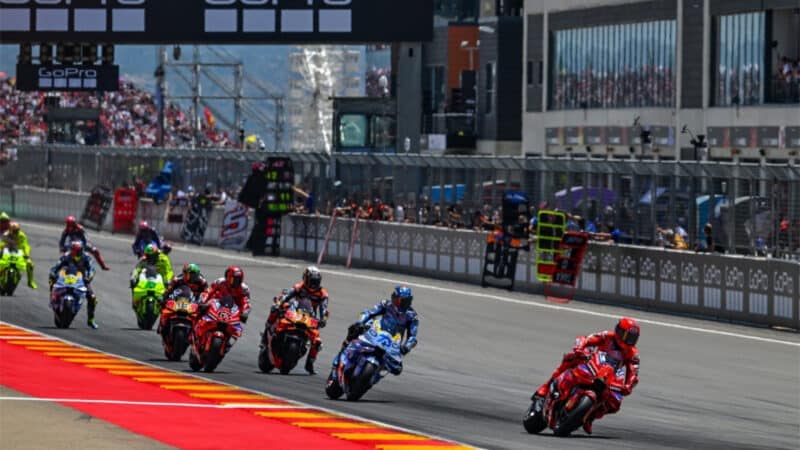
Big brother leads Sunday’s race from little brother, while Pecco Bagnaia and Pedro Acosta dispute third place
“This victory was mandatory in our garage and in myself,” he said after his 66th MotoGP success. “Why? Because if I want to fight for the championship – OK, I’m leading and I have an advantage against Alex [Márquez] and Pecco [Bagnaia] – but in two good circuits for me – Austin and Jerez – I lost 50 points. It’s there where we need to keep working.”
So what does Márquez need to work on? So far this year he’s made two mistakes: lack of focus at COTA and lack of care during the early laps at Jerez and Silverstone (where he was super lucky the race was restarted).
His first Sunday crash, at COTA, was pure lack of concentration. He was well ahead, so he had moved into controlling-the-race mode. He then ran wide through Turn 3, onto the wet kerb at 4 and down he went.
The early laps of every race are very tricky for Márquez due to the combination of Ducati’s GP25 and Michelin’s current rear slick, introduced last season. This tyre smashed plenty of lap records last year but generates so much grip at the rear of the motorcycle that it changes bike balance going into corners, reducing load – and therefore grip – at the front.
That made life very difficult for last year’s title protagonists Bagnaia and Jorge Martín, who found they weren’t so much riding a knife edge as a razor edge.
“The new rear tyre is fantastic,” said Bagnaia last summer. “But it’s making us crash more because the rear is pushing the front a lot.”
That problem is compounded by this year’s factory Ducati, which has what you might call a numb front end. So not only do GP25 riders struggle with the rear pushing the front, they also struggle to feel what’s happening with the front tyre, so it’s difficult to catch a front slide. That’s why Bagnaia and Fabio Di Giannantonio are having a mostly difficult 2025 and that’s why even Márquez, with his supernatural feeling for the front, has been in trouble.
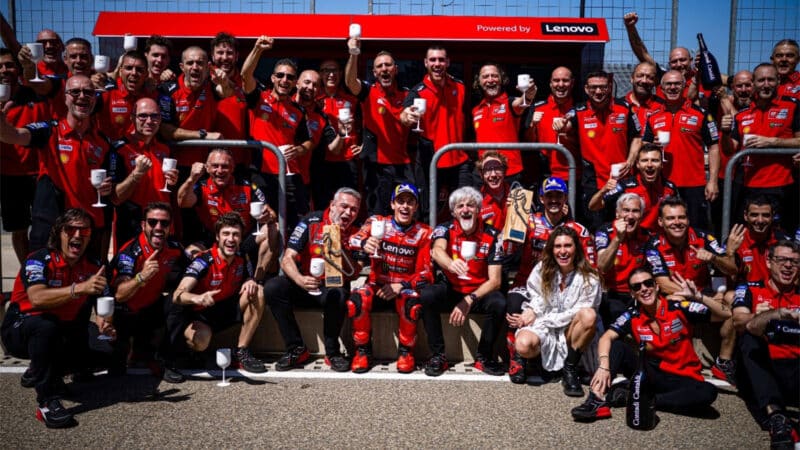
Ducati’s first double Sunday top three since Qatar – big sighs of relief from Gigi Dall’Igna and the rest
Ducati
Therefore, at Aragon he took more care than ever in the early laps. Of course, he made sure he got out front, but he wasn’t desperate to commence his escape until he felt comfortable.
“I was trying to manage the tyres in beginning,” he added.
In other words, the trickiest part of the race for Márquez is when the rear tyre is new, not when it’s old, because when the tyre is new it’s so grippy that the chance of it overpowering the front is much greater. Thus he needs to ride a few laps, wait for the rear tyre to lose a little grip and then he feels safer when he’s attacking corners.
If he has finally learned this lesson, this may be the moment when he’s really shifting into championship-winning gear.
Aragon suggested he’s also working on his focus issues, but he’s not fully fixed them yet.
“Today I was very focused,” he said. “When seven, six or five laps remained I started to think about my Austin mistake. I said, OK, how to manage the situation? I looked at the lap times and I was riding 47 lows without full concentration, so I decided to increase the speed to be focused again.”
Right now, maintaining your fastest pace is more important than ever in MotoGP. Again, it comes down to the front/rear tyre imbalance. If you ease off and don’t keep hammering the front tyre into corners, there’s more chance of the rear overpowering the front. That’s why today’s MotoGP bikes aren’t easy to ride – everyone is on a razor’s edge all the time, with no chance to take things easy in the final laps, because life will only get more difficult.
Bagnaia’s Aragon third place was his first Sunday podium since Jerez, where he also took third, behind the younger Márquez and Yamaha‘s Fabio Quartararo.
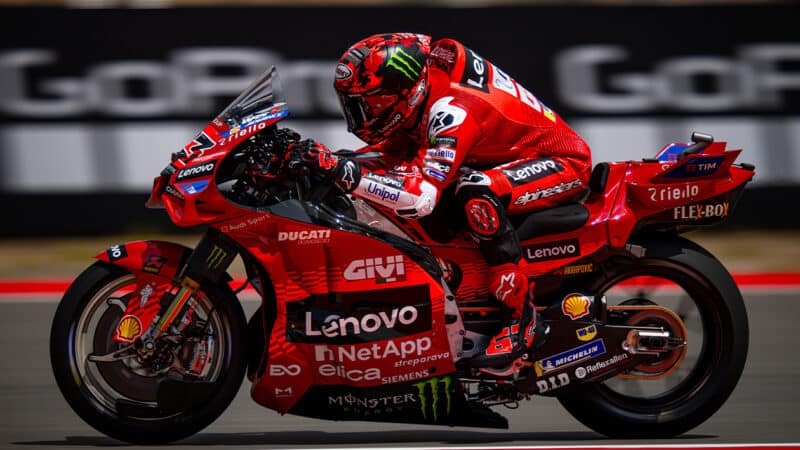
Bagnaia during Aragon practice – a switch to larger-diameter discs for Sunday’s race seemed to solve his corner-entry issues
Ducati
The result was important but the manner of it more so. The 2022/2023 MotoGP king has had a horrible 2025 so far: only one victory from 16 sprints and GPs and regularly getting beaten up by last year’s Ducatis.
Lack of feel from the GP25’s numb front end has been his problem, a problem which his team-mate (mostly) rides around.
Ducati has been trying to fix Bagnaia’s issues since pre-season testing, trying all sorts of changes to geometry, bike balance, engine-brake set-up and so on. Finally on Saturday evening crew chief Cristian Gabarrini suggested a change of front brake spec.
How can this fix a front-end feel problem?
Bagnaia couldn’t use his usual super-fast corner-entry technique because he couldn’t feel the limit, so one moment he was charging into a corner, the next he was sliding down the road, with no hint of a warning from the front tyre. That’s why he’s had more crashes than Marquez so far this season, something no one would’ve expected.
Gabarrini’s idea is to give his rider better feel with the front brake, so when Bagnaia feels the front tyre locking and skidding while he’s braking and trail-braking into corners he can better modulate the amount of stopping power he’s using, thereby avoiding a skid or a crash.
MotoGP riders and engineers have several dozen possible combinations of Brembo disc diameter, disc mass, caliper spec, brake pads and master cylinders, so it’s not easy to find the right solution.
Larger diameter front discs increase braking power, so the rider doesn’t need to squeeze the brake lever so much. So instead of grabbing a big handful of lever, Bagnaia can caress the lever a bit more, so he can be more sensitive.
“We are speaking about details,” said Bagnaia on Sunday. “Because our bike is similar to our ’24 bike and this season I’m struggling in areas where last year I was super-strong, we decided to upgrade the discs to bigger ones and it’s better.”
Thus Gabarrini and Bagnaia haven’t so much fixed the GP25’s chassis problem as found a way around it.
Both will be hoping their solution will work next time out at Mugello, where Bagnaia has won the last three GPs and the last two sprints.
Therefore this will be a hugely important weekend for Bagnaia and also for Marquez. Bagnaia will be out to stop the rot and Marquez will be out to cement his impregnability.
